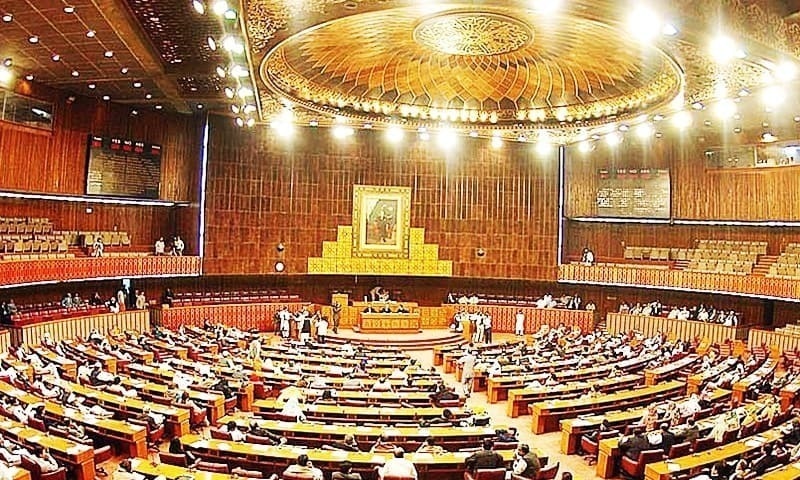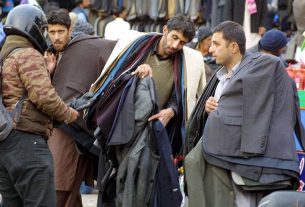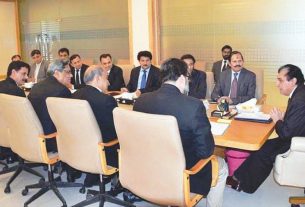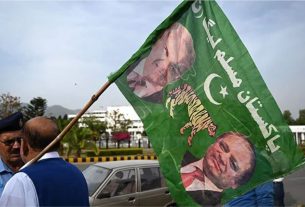ISLAMABAD: The National Assembly on Tuesday saw a rare consensus on lifting of a ban on student unions, but with certain conditions, as members from across the divide supported the opposition’s private member bill in this regard that was later sent to the relevant committee for further deliberations.
An emotional speech by Pakistan Muslim League-Nawaz (PML-N) leader and former prime minister Shahid Khaqan Abbasi, followed by his walkout over non-issuance of production order for his fellow colleague Rana Sanaullah, was the other main highlight of the NA proceedings on the private member’s day.
The Higher Education Commission (Amendment) Bill 2019 aimed at restoring the student unions in educational institutions was tabled by PML-N MNA Kesoo Mal Kheeal Das.
The bill was initially opposed by Parliamentary Secretary for Education Wajiha Akram, who said the government was already working on it as Prime Minister Imran Khan supported the idea of lifting ban on student unions. But she faced an embarrassing situation when first Human Rights Minister Dr Shireen Mazari and then Science and Technology Minister Fawad Chaudhry asked Speaker Asad Qaiser to allow the introduction of the bill.
Private member’s bill referred to house committee; ex-PM Abbasi walks out after assailing speaker over issue of production order
The lone voice against the idea of lifting the ban on student politics came from PML-N MNA from Gujranwala Bashir Mehmood Virk, who was of the opinion that the unions had distracted students from studies, besides bringing violence to campuses.
Referring to the argument that student unions served as nurseries for political leadership, Mr Virk said the Quaid-i-Azam, Zulfikar Ali Bhutto, Nawaz Sharif and Imran Khan all had served the country, but none of them had participated in student politics.
It was Planning and Development Minister Asad Umar who took the floor to respond to Mr Virk and recalled that the students had played a key role in the Pakistan Movement and provided the prime force to the Quaid-i-Azam. He said the students must have a say in the education system.
Almost all the members agreed that there was a need for a threadbare discussion on the issue before lifting the ban. They said steps be taken to prevent students from indulging in violence and other negative activities, confining their activities to educational institutions.
PML-N lawmaker Khawaja Saad Rafique and PPP legislator Dr Nafeesa Shah were of the opinion that political parties should be barred from forming their student wings in varsities.
Dr Shah suggested convening of an all parties’ conference on the issue.
While introducing the bill, the PML-N legislator said military dictator Gen Ziaul Haq had banned student unions in 1984 due to their role in the Movement for the Restoration of Democracy (MRD). He said the Senate had already passed a resolution seeking restoration of student unions and the Supreme Court had also issued a verdict.
Fawad Chaudhry said over 60 per cent of country’s population comprising youth below the age of 25 should have the right to do politics.
Shireen Mazari said that during her 16-year teaching experience at Quaid-i-Azam University, students had formed groups on ethnic and sectarian basis due to the ban on student politics.
Parliamentary leader of the PML-N Khawaja Asif said students had played a key role in the movement against military dictator Ayub Khan, but religious groups brought violence to campuses. He said students had recently organised countrywide demonstrations in support of their demand for the restoration of unions and they must be praised for seeking their rights without resorting to violence.
Terming the presentation of the bill a milestone, Aminul Haq of the Muttahida Qaumi Movement (MQM) praised the Sindh government for approving a similar bill. He said his party, which was a product of All Pakistan Muhajir Students Organisation, had a clear stance on student unions.
PPP lawmaker Abdul Qadir Patel said the provinces should do the required legislation in this regard as education was a devolved subject. He said the bill introduced in the NA would be applicable to educational institutions of Islamabad.
Production order
Mr Abbasi, who has been under custody of the National Accountability Bureau (NAB) on corruption charges in the LNG scam, had come to the house for the first time since the start of the session on Dec 4.
He lashed out at the NA speaker for allegedly succumbing to the pressure from within the ruling party on the issue of production orders for the jailed opposition members.“I will not beg you for a production order and I am going back,” he said before leaving the house in protest.
Mr Abbasi disclosed that he had written three letters to the NA speaker, seeking the issuance of production orders for all the jailed opposition members. “I will place your reply in the NA library for record which you had sent through a section officer telling me that only you have the powers to issue production orders,” he said while addressing the speaker.
“You have asked me to go to the court. I have great respect for the chair even if you have no respect,” he went on to say while looking at the red-faced Speaker Qaiser.
Mr Abbasi noted that five members of the assembly were “currently in detention without conviction”, telling the NA speaker that it was his duty to issue production orders for every member at the start of each session. “My production order carries the date of Dec 4, but I have been brought here today. Do you have the courage to take notice of the non-implementation of your orders?” he asked.
“If you need any support from the government, we will provide you,” Asad Umar assured Speaker Qaiser.



